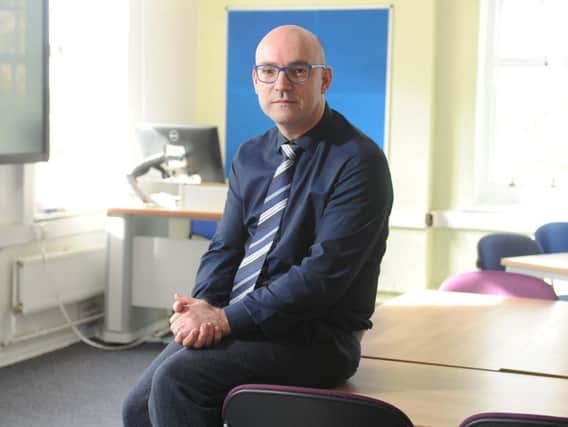Leeds Beckett University professor tells how schools are tackling a mental health crisis among pupils


A crisis in young people's mental health means teaching staff are being trained to spot the signs of emotional problems in youngsters.
And some some schools are even using sophisticated computer software to carry out surveys to 'map' the wellbeing of pupils as mental health issues threaten to harm academic achievement.
Advertisement
Hide AdAdvertisement
Hide AdNew ways of improving wellbeing in schools are being found with help from Leeds Beckett University's Carnegie Centre of Excellence for Mental Health in Schools.
The centre, which delivers teacher training and carries out research into the mental health of school children, is led by Professor Jonathan Glazzard, who was previously a primary teacher in Barnsley for 12 years.
Prof Glazzard said teachers needed to be increasingly aware of youngsters' mental health issues and how to get them the support they need.
He said: "It's looking for things like changes in behaviour, sudden changes in mood. It could be their attendance dropping off, academic grades staring to go down.
Advertisement
Hide AdAdvertisement
Hide Ad"It's looking for the signs in children that are not typical for that child. Often we focus on signs that are visible. But some children develop mental health problems and get good at covering it up. They might me self harming and be very good at hiding it.
"You need to ensure that it doesn't go under the radar."
Latest NHS figures show around one in eight under 19s in England has some form of mental health issue.
Research found that at age 14, some 22 per cent of girls and nine per cent of boys have self harmed.
More than 23 per cent of young women aged 17-19 had a mental health disorder, twice the rate of young men.
Advertisement
Hide AdAdvertisement
Hide AdThe young people's charity Childline said it delivered 3,135 counselling sessions on exam stress in 2016-17 – a rise of 11 per cent in two years.
Prof Glazzard said some schools are carrying out wellbeing surveys which can track the mental health of individual pupils and year groups.
He said: "Some schools are doing universal screening to identify those children that might be having mental health problems. In secondary schools some are doing self-assessment.
"We are talking to schools who are doing it three times a year. Some schools have bought in software packages. It goes on a database and produces data for senior leaders to see if there's an issue with a particular year group or how boys are doing well compared to girls.
Advertisement
Hide AdAdvertisement
Hide Ad"It goes on a database and we can group that data to see patterns and trends.
"It's patchy, but there are schools that are taking mental health very seriously because they recognise that if children are to perform well academically they need to be mentally healthy."
While new technology is being used, Prof Glazzard said creating an environment where pupils feel able to talk about their mental health is vital.
He said teachers had been reporting rising numbers of children in need of help.
Advertisement
Hide AdAdvertisement
Hide AdHe said: "That culture is really key. It's up to the leadership of the school to promote a culture of openness.
"When I talk to teachers they say it's increasing. We don't really know if we are just better at identifying it, but anecdotally it is increasing."
Long waiting lists and strict criteria youngsters' need to meet before they get professional help on the NHS also means schools need to look out for youngsters' mental wellbeing. Prof Glazzard said: "The referral criteria are really stringent and that means schools can't access those services. That's is why staff need to be trained."
Cuts to school budgets are making it difficult to provide extra support like counselling. "But there are some really simple things that have not cost. Having a culture where children can talk about it," Prof Glazzard said.. "Having a culture where children can talk about it. Just promoting positive mental health.
Advertisement
Hide AdAdvertisement
Hide Ad"Some school shave peer mentoring schemes and mental health champions.
"We have schools where LGBT pupils are leading workshops and educating staff and the student body. They are doing some really great things."
"Putting young people in the driving seat and giving them that sense of responsibility can be really important."
Prof Glazzard has previously warned that excessive time spent on social media can lead to anxiety and depression in children, along with body image issues.
Advertisement
Hide AdAdvertisement
Hide AdHe said: "Social media is an issue. It's a big issue in secondary schools. Children are constantly on social media and not getting any sleep because they are on their phones, so they come into school just exhausted."
Leading the way in improvements to school mental health
The Carnegie Centre of Excellence for Mental Health in Schools was set up to help boost wellbeing at all levels of the UK education system.
The centre, run in partnership with the social enterprise Minds Ahead, delivers professional training programmes and helps schools develop mental health policies and procedures.
In July this year, it will bring together school leaders and mental health professionals at its third annual conference in Birmingham.
Advertisement
Hide AdAdvertisement
Hide AdSchools can also apply to the centre's School Mental Health Awards for recognition of their work to boost wellbeing. Nationally, more than 500 schools have signed up to take part in the mental health award.
And the first international school was recognised by the scheme when British School Al Khubairat in Abu Dhabi was awarded the Silver Standard.